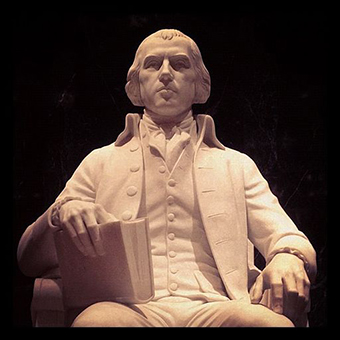Dec 02, 2013
Municipalities violate state laws and their own city charters with anti-gun ordinances
Kit Daniels
Local governments across the country are trying unsuccessfully to enact gun control through city ordinances even though such attempts violate the Bill of Rights, state laws and even their own city charters. |
| James Madison wrote the text of the Second Amendment. |
state law and the Town of Bethany Beach, Delaware was stopped from closing down a legally-licensed gun store.
Last year, a Bethany Beach resident wanted the Town Council and the Mayor to prohibit Bethany Cycle and Fitness from selling and transferring firearms even though the bike shop had obtained a Federal Firearms License from the Bureau of Alcohol, Tobacco and Firearms.
“Selling guns in Bethany Beach doesn’t fit with the image we’re trying to project,” the resident said according to the Daily Times. “I don’t see why it’s necessary. It’s a family resort with a lot of retired persons.”
“It’s simply not the venue for selling guns.”
Appeasing to the resident’s demand, the city moved to outlaw gun shops but was fortunately stopped by the Delaware Code which states that municipalities cannot restrict the ownership, transfer or possession of firearms.
“It’s interesting that the state would pass a law that the towns can’t do something that they should have the right to do,” McClenny said to the The Daily Times.
Yet the city’s own charter states, in the first paragraph no less, that the Town of Bethany Beach may not pass “ordinances, rules, resolutions and regulations” that are “in conflict with the Constitution and Laws of the State of Delaware or of the United States.”
In essence, the mayor and the Town Council wanted to violate their own city charter as well as individual rights and the mayor complained when the Delaware Code and the Constitution prevented them from doing so.
In 2011, the North Carolina General Assembly passed a law prohibiting municipalities from banning Concealed Handgun License holders from carrying guns in public parks.
The legislation, however, also allowed city governments to ban concealed firearms in “recreation facilities” such as “a playground, an athletic field, a swimming pool and an athletic facility,” according to the Charlotte Observer.
In response, several cities across the state began to abuse the provision by passing gun bans which exceeded the assembly’s intent.
“Unfortunately what we found after that was municipalities for ideological reasons … were actually torturing the English language to include as recreation facilities entire parks with hiking trails, greenways and other areas which were clearly not the intent of the General Assembly,” Paul Valone, founder of Grass Roots North Carolina, said to the newspaper.
His group as well as others pushed for new state legislation which would stop these unlawful gun bans and their efforts resulted in a new state law which expanded where CHL holders could carry legally.
Grass Roots North Carolina also made sure that the municipalities obeyed this new law and even threatened to sue the City of Raleigh for not removing “No Guns Allowed” signs from public parks.
The city finally took down the signs under this intense pressure.
“The days when local government bureaucrats can ignore state law with respect to firearms are over,” Valone said. “We want these municipalities to comply with the law.”
“I don’t think that’s too much to ask.”